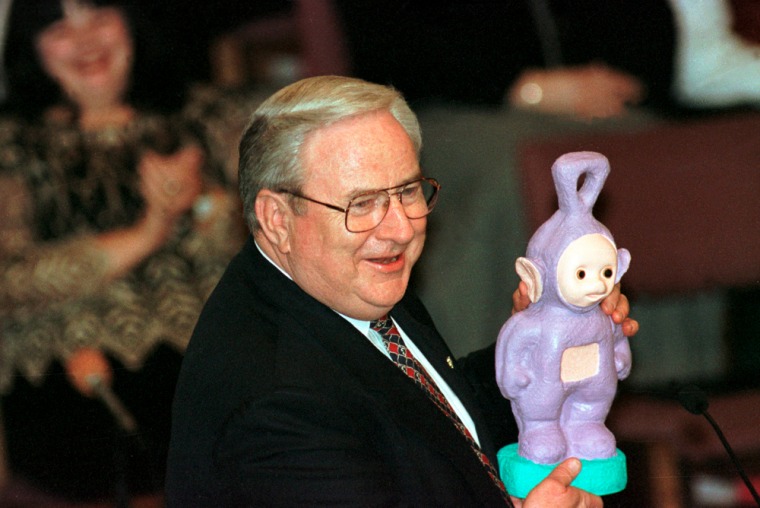The Rev. Jerry Falwell’s habit of sounding off on everything from liberals and terrorism to the “Teletubbies” regularly embarrassed his fellow conservatives.
But it would be a mistake to remember the pastor as out of touch, or the buffoon his critics made him out to be.
Falwell turned a major segment of U.S. Christianity into a political sledgehammer — even if the movement has not achieved all of its goals and its leader’s tongue got him in trouble.
His decision in the 1970s to confront an American culture that he saw in moral free fall helped touch off a mass movement that transformed the Republican Party and U.S. politics. When he died Tuesday at age 73, white evangelicals comprised more than one-third of the GOP base and were among the Republicans’ most reliable supporters.
“Just as the black church never again has to be indoctrinated to get involved politically, neither does the evangelical church,” Falwell told William Martin, author of “With God On Our Side, The Rise of the Religious Right in America.”
Entry into politics
It may be hard to remember now, but conservative preachers avoided politics in the days when Falwell began his ministry. Then the U.S. Supreme Court legalized abortion in 1973.
“Religious people and religious values were being squeezed out of the public square,” said the Rev. Ed Dobson, who worked at Falwell’s side from 1973 until 1987.
As founding pastor of Thomas Road Baptist Church in Lynchburg, Va., Falwell began meeting with theologians and lawmakers to see how Christians could fight back. His foes? Liberals, “abortionists,” the American Civil Liberties Union, feminists, gay rights activists and the faithless.
In 1979, he and his allies launched the Moral Majority. Falwell not only drew preachers from behind their pulpits into the brawling world of electoral campaigns, but he also brought conservative politics into the church. He helped persuade thousands of pastors nationwide to conduct voter-registration drives in their congregations, contributing to a flood of new voters on the GOP rolls.
“The Rev. Falwell’s creation of the Moral Majority was a turning point in history for the church in America,” said the Rev. Lou Sheldon of the Traditional Values Coalition. “His legacy will last for decades to come.”
The Moral Majority platform mixed traditional Christian values with a strongly conservative world view: Falwell wanted prayer in public school and more money for national defense, too.
When Christian activists helped Ronald Reagan win the 1980 presidential race, Falwell credited the Moral Majority and became the mouthpiece for newly empowered Americans “who felt they and their beliefs were disrespected,” said Cal Thomas, the syndicated columnist and Moral Majority spokesman for six years.
But Falwell and conservative Christians soon learned the limits of their political might.
They were courted by lawmakers and appeared with Reagan in the Rose Garden, yet their direct access to power changed little. Abortion has remained legal and gay couples have gradually won greater acceptance.
Activists questioned Falwell’s ability to mobilize voters and, with the minister focused on politics, fundraising for his religious work suffered badly. Critics to his right, who advocated old-style isolation from the broader culture, attacked him.
In the late 1980s, Falwell disbanded the Moral Majority, saying he wanted to concentrate on the Christian school he founded, Liberty University.
He did not disappear, however.
Waning reputation
GOP political candidates sought his backing and, in later years, treated him as an elder statesman of the party. In 2000, he prayed on the rostrum of the Republican National Convention.
But at the same time, Falwell’s fiery attacks in the culture wars began eroding his reputation.
In 1999, Falwell’s National Liberty Journal warned parents that Tinky Winky, a purple, purse-toting character on television’s “Teletubbies” show, was a gay role model and morally damaging to children.
After the Sept. 11 terrorist attacks, Falwell said that abortionists, feminists, gays and others “have tried to secularize America ... helped this happen.” President George W. Bush, himself a conservative Protestant, rebuked Falwell, who soon admitted the comment was a mistake.
A 2004 poll for PBS’s “Religion & Ethics Newsweekly” showed U.S. evangelicals had lower regard for Falwell than Pope John Paul II. That year, at the Republican National Convention, Falwell’s only appearance was at a private rally for religious, anti-abortion Republicans. He was asked to stand and wave to the crowd, then whisked away.
Despite his waning political star, Falwell’s greatest impact may lie ahead.
With 7,700 students, his Liberty University reflects the minister’s classic fundamentalist beliefs in an inerrant Bible and the imminent return of Jesus Christ following seven years of tribulation to establish a 1,000-year kingdom. The school annually turns out young, Christian adults who go on to become active in politics.
This year’s graduation will be held as scheduled, on Saturday.
